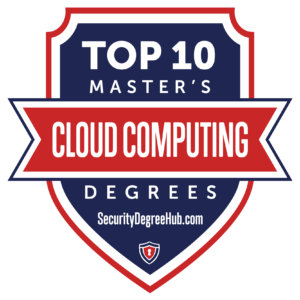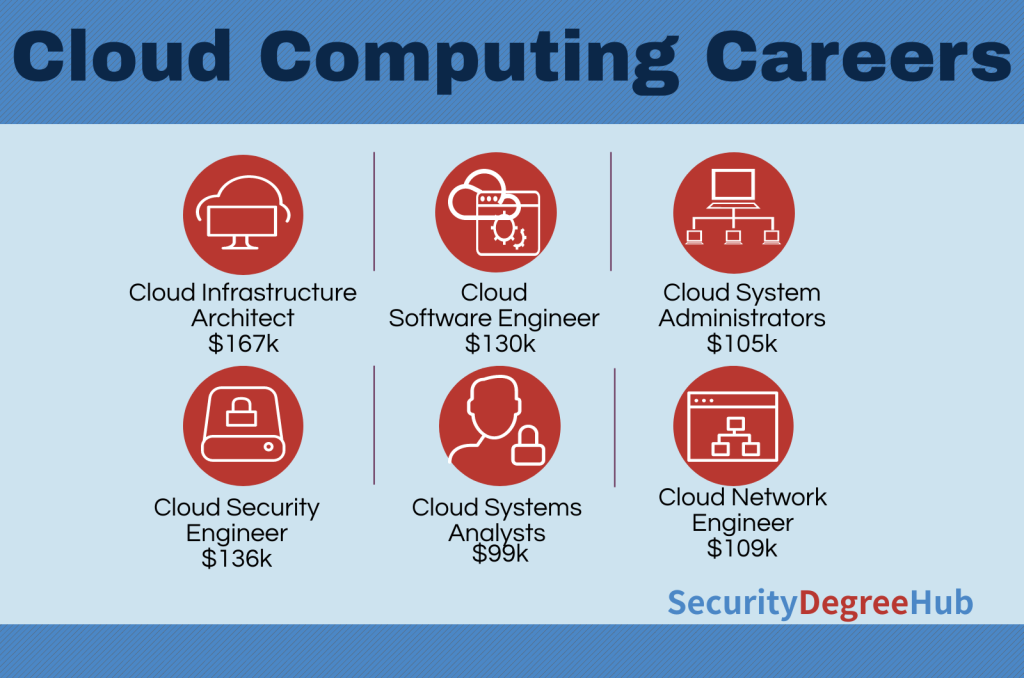
The best master’s in cloud computing degree programs offer professionals a flexible path to a career with great job growth and excellent pay. In technology, what was once the wave of the future quickly becomes a standard, and that’s definitely the case when it comes to cloud computing.
For IT professionals in an increasingly competitive job market, having a cloud computing master’s degree is a huge asset in today’s increasingly digital world. Earning a master’s degree in cloud computing equips these technology professionals with a host of skills employers need. In addition, graduates of such programs will have the know-how to set up and operate cloud-based systems.
According to industry analysts, the employment outlook for jobs in cloud computing is promising, and salaries continue to rise. However, as more businesses shift to the cloud, vendors will need to onboard more staff to keep up with demand. In addition, the growth of automation and related innovations is projected to create more opportunities in IT overall, too.
Ranking the Best Master’s Degree in Cloud Computing Programs
Security Degree Hub editors feature only accredited, reputable institutions, with programs ranked according to practical factors. Using data from IPEDS and Niche, editors rank master’s in cloud computing degrees according to cost, reputation, and salary potential.
1. University of Illinois at Urbana-Champaign

Students searching for a cloud computing master’s degree may want to consider the online Master of Computer Science in Data Science from the University of Illinois Urbana-Champaign. For breadth of study, this program requires one course in each of these four disciplines: cloud computing, data visualization, data mining, and machine learning. The MCS in Data Science does not require a thesis. Students learn about computational and statistical methods that are changing society and business. The coursework focuses on the ability to find meaning in a large set of data. Thirty-two hours of graduate coursework are required to complete the program.
The Grainger College of Engineering is a leader in research and engineering education in every field. The school is consistently included in engineering rankings and is dedicated to providing a transformative educational experience for its students. The school is big enough to be able to provide a world-class education to every student at both the graduate and undergraduate levels.
Credits: 36
Program: Master of Computer Science in Data Science (MCS-DS)
More: Want to know more? Visit the program site!
2. Ball State University
The Master of Science in Information and Communication Science at Ball State University takes students two years. Ball State University offers a Master of Science in Information and Communication Science with a cloud computing emphasis. This program provides students with a comprehensive understanding of cloud computing fundamentals, practical application to real-world scenarios, and explores the security and privacy challenges of using cloud services. This program also covers topics from system design to data protection to cost analysis.
Credits: 38
Program: Master of Science in Information and Communication Science
More: Want to know more? Visit the program site!
3. Arizona State University

Students looking for a master’s in cloud computing online might be interested in the online Master of Science in Information Technology from Arizona State University. This program gives students competencies in advanced technology in areas like networking, information systems, and cybersecurity. Students gain the ability to brainstorm, plan, and implement information technology projects for users and stakeholders. In addition, they gain hands-on experience by completing an applied project and building a portfolio, which gives them something to show prospective employers after graduation. Additionally, students can choose from two concentrations: information systems management and systems development or computer architecture and information security.
Arizona State University’s faculty and students work with NASA to develop new space exploration innovations. US News and World Report recognize the school as the most innovative school in the country. The school’s faculty includes Pulitzer Prize winners and Nobel laureates. In addition, the school advances economic development, entrepreneurship, strategic partnerships, and pioneering research.
Credits: 30
Program: MS in Information Technology
More: Want to know more? Visit the program site!
4. Southern Methodist University

The online MS in Data Science at Southern Methodist University is for aspiring and current data science professionals who want to learn how to understand, mine, analyze, and manage complex data to make better decisions for their organizations. The program includes online face-to-face classes, collaborative group activities, and interactive coursework that gives students the communication, analytical, and technical skills to make solid data-driven decisions. This interdisciplinary curriculum draws from the arts, engineering, sciences, and humanities. Students can choose from a specialization in business analytics or machine learning. Featured courses include Machine Learning, Natural Language Processing, and also Business Intelligence.
Southern Methodist University is a private university with seven schools or colleges. SMU offers innovative programs, international study, leadership opportunities, and also small classes. Furthermore, the learning environment encourages mentoring, internships, community service, and also research. SMU is committed to creating, expanding, and imparting knowledge through service, research, and teaching. The school promotes the worth and dignity of all individuals.
Credits: 33.5
Program: online Master of Science in Data Science
More: Want to know more? Visit the program site!
5. University of North Dakota

The University of North Dakota offers an MS in Computer Science that helps students improve their problem-solving skills by using technology to make better decisions. Some of the courses students might take as part of the program are security for cloud computing, machine learning, analysis of algorithms, advanced software engineering, high-performance computing and paradigms, and theoretical foundation of computer science. Graduates may find work as network analysts, computer scientists, systems integration engineers, cybersecurity specialists, systems engineers, or software engineers.
The University of North Dakota is ahead of its time—and always has been. In fact, it was established before North Dakota was even a state. The school is a leader in unmanned aircraft systems, aviation, medicine, and engineering. In addition, UND is a military-friendly school with more than 250 student organizations and an average class size of 24.
Credits: 30 (non-thesis and thesis options available)
Program: Master of Science in Computer Science
More: Want to know more? Visit the program site!
6. George Washington University

The online Cloud Computing Management master’s degree from George Washington University is a good choice for students who want to earn their master’s in cloud computing online. Students learn to manage the complexities and challenges of cloud computing to optimize their company’s use of the cloud. They learn to integrate services from multiple vendors and protect data stored in the cloud. The program helps students determine which business applications are well-suited to the cloud and teaches them how to migrate critical software and systems to the cloud environment without disrupting services.
George Washington University offers a spirit of exploration, pioneering research, and a world-class faculty. In addition, the school is dedicated to providing support for online students and ensuring that they are connected to the same resources provided to the school’s on-campus students.
Credits: 30
Program: Master of Engineering in Cloud Computing Management
More: Want to know more? Visit the program site!
7. San Jose State University

The MS in Software Engineering at San Jose State offers a specialization in cloud computing. This cloud computing master’s degree has two required courses: Cloud Technologies and Virtualization Technologies. The MS in Software Engineering builds on a foundation of engineering and computer science and integrates software engineering into that foundation. Students must also choose one more class for the specialization from a list of ten courses. Through this specialization, students gain an understanding of virtualization and cloud computing. They learn principles, deployment, design, analysis, modeling, and industry-oriented applications. In addition, the curriculum covers enabling technologies and major solution architectures.
SJSU is Silicon Valley’s public university. The school is committed to reaching its potential as a prominent urban university. It offers doctoral, master’s, and bachelor’s degrees in 250 disciplines. The school has about 36,000 students and 4,300 employees and is an essential contributor to social, cultural, and economic development in the Silicon Valley and throughout California.
Credits: 33
Program: Master of Science in Software Engineering (MSSE) with a specialization in Cloud Computing and Virtualization
More: Want to know more? Visit the program site!
8. University of Maryland Global Campus

The University of Maryland Global Campus offers a master’s degree in Cloud Computing Architecture that gives students the knowledge and skills they need to operate and design cloud computing platforms. In addition, students gain the management and technical skills required to help their companies transition to the cloud. The curriculum includes communication, procurement, financial management, and technical skills. Required core courses include Cloud Computing Orchestration, Cloud Computing Implementations & Migrations, and also Cloud Infrastructure Planning, Design, and Configurations.
The University of Maryland Global Campus started to serve working adults and armed forces members. It is an online state university that offers programs in several in-demand and fast-growing fields. Course materials are provided at no additional cost to the student in most cases. Additionally, the NSA and DHS designated the school a National Center of Academic Excellence in Cyber Defense Education.
Credits: 36
Program: Master of Science in Cloud Computing Systems
More: Want to know more? Visit the program site!
9. Marist College

The MS in Software Development at Marist College offers a concentration in Cloud Computing. This cloud computing master’s degree includes hands-on training using the latest technology that helps students learn how to design, develop, and implement software programs and systems. Students can connect to the Virtual Computing Laboratory from anywhere with a computer and high-speed internet access. The program provides a comprehensive foundation in computer science and provides the hands-on experience employers are looking for. Core courses include Database Management Systems, Security Algorithms & Protocols, and also Networking.
In addition, Marist is home to the NYS Center of Excellence in Cloud Computing & Analytics. Graduates may find work as programmers, systems analysts, and also network specialists. And Marist offers two graduate certificates in Business Analytics and Information Systems. Marist College has two campuses in New York and also in Florence, Italy. The school helps students develop the skills, character, and intellect needed to live productive, ethical, and enlightened lives. The school has over 6,400 students and offers 47 undergraduate majors.
Credits: 32-40
Program: MS in Software Development with a Cloud Computing track
More: Want to know more? Visit the program site!
10. Capella University

The MS in Information Technology at Capella University offers a specialization in enterprise networks and cloud computing. This master’s degree in cloud computing prepares students to work on enterprise networks inside of a data center and build cloud computing architecture and infrastructure. Students gain hands-on experience working on an applied IT project that addresses a real-world problem. The focus is on emerging and current cloud infrastructure and enterprise network issues and trends. Students learn to plan, design, implement and contribute to transition or migration processes. They also study security and network governance issues for complex networks.
At Capella University, students learn smarter. A Capella education fits the way students live today and puts them in control as they earn their degrees online. For example, Capella’s FlexPath allows students to leverage their experience, manage their costs, and set their deadlines. In addition, the school’s online curriculum is designed with input from industry leaders, so what you learn will transfer directly to the workforce.
Credits: 48
Program: Master of Science in Information Technology with a Enterprise Networks and Cloud Computing specialization
More: Want to know more? Visit the program site!

What Is a Cloud Computing Master’s Degree?
A Cloud Computing Masters Degree is an advanced academic degree that focuses on the theory and practice of developing cloud-based systems. Students can expect to take courses in cloud computing systems design, computer engineering, project management, distributed systems, and software engineering.
This program of study typically provides a comprehensive overview of cloud computing technology, cloud architecture, security considerations, cloud computing security, open source frameworks, and storage solutions. Graduates qualify for a variety of information technology occupations.
Why Should You Earn a Master’s in Cloud Computing?
Pursuing a master’s in cloud computing online can come with several advantages over a traditional program. But, first, consider some of the “pluses” of virtual learning.
Time-Management Flexibility
Students enrolled in a master’s in cloud computing online aren’t constrained by the typical school schedule, so they can study when it’s convenient. Instead of trying to squeeze in study time around work and family responsibilities, they can prioritize those obligations and still find time for schoolwork. Scheduling flexibility also gives students more leeway to work at their own pace, progressing quickly through more accessible subjects to concentrate on the material that poses more of a challenge to them.
Study Anywhere
Since students in a virtual master’s degree in cloud computing program don’t have to attend classes at a physical location, they can study anywhere that has a consistent internet connection. Additionally, they don’t have to contend with commuting to and from school. Finally, since they’re not limited to attending school near their homes, cloud computing master’s degree candidates can enroll in colleges and universities anywhere in the country or even the world.
An Online Community of Like-Minded Learners
Enrolling in a cloud computing master’s degree program online doesn’t mean studying in isolation. On the contrary, most quality programs provide a variety of means for students to contact their instructors and connect with classmates to build a sense of community. Remote learners tend to be a wildly diverse group, representing various age groups and walks of life. But, their common goal to earn a master’s degree in cloud computing brings them together.

What are the Admissions Requirements for a Master’s in Cloud Computing?
Admission into a master’s degree in Cloud Computing program generally requires applicants to have a Bachelor’s degree. Most programs prefer it to be in a related field such as computer science or information systems, or a student to have prior experience with programming.
Many schools also require some, or all, of the below items.
- a minimum undergraduate grade point average (GPA) ranging of 3.0 or higher
- relevant work experience and/or professional certifications
- letters of recommendation and personal statements
- some programs may also require students to take an entrance exam or submit GRE test scores
- some programs may list additional requirements, such as the completion of specific prerequisite classes prior to enrollment
What Do You Learn in a Master’s in Cloud Computing Program?
Coursework gives students a broad understanding of cloud technology. A cloud computing master’s degree course typically covers topics and skills like:
- Configuration and Implementation of Cloud Services
- Distributed Computing Concepts
- Network Engineering Concepts
- Enterprise Network Management
- Cloud-Management Technologies
- Cloud Services
- Data Analytics and Data Management
- Cloud Applications Architecture
- Network Management Protocols
- Fundamentals of Cloud Computing
- Emerging Technologies
- Cloud Migration Strategy
- Risk Management and Intrusion Detection
How Do You Choose a Cloud Computer Master’s Program?
No two cloud computing programs are exactly alike. Here’s what to look for when choosing the best university for a master’s in cloud computing.
Curriculum
The best university for a master’s in cloud computing degree offers the right blend of practical skills and cloud development. A balanced curriculum consists of cloud computing concepts with a solid foundation in software engineering and computer science fundamentals.
Cost
In order to accurately evaluate the cost of a program you need to determine how many credits you need to graduate and the cost per credit. For simplicity, multiplying the two should result in the total cost. Some common calculation pitfalls are not understanding if your school is on a semester system or quarter system. Also full time versus part time attendance can affect what you pay. An finally, online and accelerated degree programs can have different schedules and tuition cost per credit.
Accreditation
A quality program has accreditation from an independent agency recognized by the US Department of Education or the National Council for Higher Education. This certification shows that the school or program meets high standards in terms of business operations, instruction qualifications, and curriculum quality.
Instructors and Faculty
Instructors who teach cloud computing should have considerable hands-on experience in the field and possess a wide range of skill sets. And experienced faculty members are a sign of a quality curriculum. So before selecting a program, make sure you review the faculty members.
Networking Opportunities
Students considering earning a master’s in cloud computing should consider what they want to do with their credentials. In many cases, the right program may not be from the best university for a master’s in cloud computing. Instead, students should find a school with a curriculum and professional associations for their interests and needs.

What Can You Do with a Master’s in Cloud Computing?
Jobs in cloud computing allow tech specialists to work in manufacturing, consulting, government, post-secondary institutions, consulting, scientific research, and many other settings.
A master’s in cloud computing can fetch you a higher salary. It can also provide cloud computing professionals with many career pathways to a host of jobs in this branch of IT. Below are some popular jobs for cloud computing professionals. Job titles and Cloud Computing roles typically fall into one or more of the below three categories.
- Cloud Architecture Roles – plan the cloud infrastructure
- Development Roles – build the cloud platform
- Cloud Support Roles – on-board, trouble-shoot, secure, and maintain the cloud network

Cloud Infrastructure Architects
Cloud architecture is the framework in which cloud technologies operate. A Cloud Infrastructure Architect designs and implements the cloud computing strategies of a company or organization.
Average Salary: $166,720 (salary dot com)
Also referred to as: Cloud Network Architect/Cloud Network Architecture
Cloud Engineers
The field of Cloud Engineering includes designing aspects of cloud architecture, managing an organization’s use of the cloud, including application development, resource allocation and maintenance, and effective use of the features offered by the industry’s primary cloud services.
Average Salary: $123,452 (Indeed)
Also referred to as: Cloud Engineer, Cloud Systems Engineer, Cloud Solutions Architect, Cloud Computing Engineer, Cloud Architect, Cloud Developer, Cloud Support Associate, Cloud Operations Manager
Cloud Security Engineers
A Cloud Security Engineer maintains the security of an organization’s cloud computing and protects it against cyberthreats.
Salary: $136,485 (Payscale dot com)
Also referred to as: AWS Security Engineer, Azure Security Engineer, Cloud Cybersecurity Engineer, Cloud Infrastructure Security Operations Engineer, Cloud Security Operations Engineer, Customer Success Cloud Security Engineer, GCP Security Engineer, Intern Cloud Security Engineer
IT Cloud System Administrators
A Cloud Systems Administrator provide security configurations, patching, and troubleshooting to cloud servers. These professionals maintain cloud computing systems and manage the performance of an organization’s cloud infrastructure to ensure that operations are performed efficiently and effectively.
Salary: $105,258 (Salary dot com)
Also referred to as: Cloud Database Administrator, Azure Cloud Administrator, Cloud Infrastructure Administrator, Cloud Administrators, Cloud Network Manager, Information Systems Managers
Cloud Systems Analysts
A Cloud Systems Analyst evaluates and identifies the optimal cloud hardware and software. Then they develop scalable architecture to support applications on IaaS and PaaS platforms
Salary: $99,600 (Salary dot com)
Also referred to as: Cloud Architecture Manager, Cloud Computing Analyst

What is the Job Outlook in Cloud Computing?
The Bureau of Labor Statistics predicts (BLS) the overall employment in computer and information technology occupations to grow fifteen percent (15%) over the next decade. This is much faster than the average for all occupations and is expected to create over 680,000 new jobs over this period. In addition to new jobs from this growth, workers can expect around 415,00 openings each year from replacement needs as workers retire.
What is the Expected Salary in Cloud Computing?
How much can you earn with a master’s in cloud computing? Workers in computer and information technology occupations earn a median annual wage of $97,430 (BLS). Below is the BLS wage information for these Computer and Information Technology Occupations.
| Occupation | Salary |
|---|---|
| Computer and Information Research Scientists | $131,490 |
| Computer Network Architects | $120,520 |
| Software Developers, Quality Assurance Analysts, and Testers | $109,020 |
| Information Security Analysts | $102,600 |
| Database Administrators and Architects | $101,000 |
| Computer Systems Analysts | $99,270 |
| Computer Programmers | $93,000 |
| Network and Computer Systems Administrators | $80,600 |
| Web Developers and Digital Designers | $78,300 |
| Computer Support Specialists | $57,910 |
Advancing Your Career with Cloud Computing Management Roles
Job-seekers scanning job listings in the IT realm can also find positions in cloud management. Cloud computing manager jobs involve maintaining all aspects of cloud services and products. In addition, cloud computing jobs in this area involve public and private cloud environments and hybrids.
Jobs in cloud computing management require employees to help companies transition to the cloud if they haven’t already done so. This involves migrating data and applications to the cloud to streamline processes. To accomplish this, cloud managers conduct initial assessments and determine which technologies best fit the company.
The cloud computing manager’s job description often involves collaborating with analysts and customer service personnel to ensure that the implemented solutions are helping the company accomplish its goals. Managers also conduct follow-up evaluations to identify any IT shortcomings to recommend the most practical solutions without causing major workflow disruptions.
Related:
- How Much Do Could Architects Make?
- 10 Best Cloud Computing Bachelor’s Degree Programs
- How To Become A Cloud Architect?
- 10 Best Cloud Computing Certifications
- Top 20 Online Information Assurance Degrees
- 25 Online Master’s in Security Risk Management
- 20 Best Online Master’s in Cybersecurity